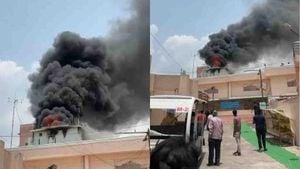In a significant development regarding the ongoing investigation into the actions of former Spanish Minister José Luis Ábalos, the Supreme Court has indicated that there are sufficient grounds to investigate Isabel Pardo de Vera, the former president of Adif, for the allegedly irregular hiring of Jéssica Rodríguez. This hiring took place at two public companies, Ineco and Tragsatec, during the time when Rodríguez was in a relationship with Ábalos, who served as Minister of Transport from 2018 to 2021.
On April 23, 2025, Judge Leopoldo Puente of the Supreme Court issued a resolution stating that Pardo de Vera's involvement in the hiring process warrants further scrutiny. According to the judge, there are indications of a "capricious" and "apparently irregular" hiring process that led to Rodríguez being employed despite her lack of any actual work performed for the companies in question.
Rodríguez, who was hired between 2019 and 2021, admitted during her testimony that she did not carry out any work for either Ineco or Tragsatec, yet she received a net monthly salary of approximately one thousand euros from both companies. The judge noted that Pardo de Vera "would have actively intervened in the perfection of the contract" for Rodríguez, raising questions about the legitimacy of the hiring.
In his resolution, Judge Puente pointed out that Rodríguez was selected from a pool of 177 candidates without any recorded interview process, despite eight of those candidates meeting the necessary qualifications. He remarked that the hiring decision appeared to be made on a whim by Ábalos, who had significant influence over the process.
This case, known as the Koldo case, originated from an investigation into the contract awarded to the company Soluciones de Gestión SL for the supply of masks during the COVID-19 pandemic. The investigation has since expanded to include other allegations of irregularities in public contracting.
Judge Puente has referred the matter to the National Court, as Pardo de Vera is not a member of parliament and therefore does not enjoy the same legal protections as Ábalos, who is still serving as a deputy. The Supreme Court is handling the case concerning Ábalos due to his parliamentary status, while the National Court will assess the evidence against Pardo de Vera.
In addition to the inquiry into Pardo de Vera, the judge has ordered the Central Operational Unit (UCO) of the Civil Guard to investigate the awarding of public works contracts highlighted in documents provided by Víctor de Aldama, a businessman linked to the case. These documents allegedly contain handwritten notes indicating pre-awarded contracts to companies involved in the scandal.
As part of the investigation, the judge has summoned Claudia Montes, a former Miss Asturias and another individual with ties to Ábalos, to testify regarding her hiring at LogiRail, a public company associated with the Ministry of Transport. Montes's hiring is also under scrutiny, as it appears she may have been employed irregularly due to Ábalos's influence.
Judge Puente has also called César Moreno, a partner of Aldama, to provide insight into alleged periodic payments made to Koldo García, a former advisor to Ábalos, which could shed light on the financial dealings surrounding the case.
Despite requests from Ábalos's legal team to summon Interior Minister Fernando Grande-Marlaska and Secretary of State for Security Rafael Pérez Ruiz as witnesses, Judge Puente has deemed their testimonies unnecessary for the investigation. The judge emphasized that no irregularities have been identified in the contracts related to the acquisition of masks by the Ministry of Interior, which were also supplied by Soluciones de Gestión.
In his ruling, Judge Puente expressed skepticism about the relevance of the testimonies requested by Ábalos's defense, stating that their connection to the case remains unclear. The judge noted that the defense failed to articulate how these individuals could contribute meaningful information to the investigation.
The ongoing investigation continues to unfold, with significant implications for those involved, including Pardo de Vera and Ábalos. As the legal proceedings progress, the scrutiny of public contracts and the ethical conduct of public officials remains a critical issue in Spanish politics.







